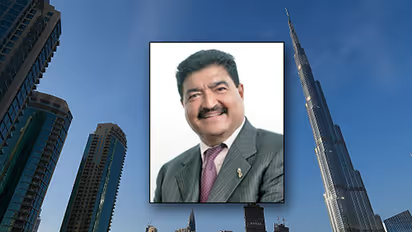Vajpayee, Modi once campaigned for the world's richest Kannadiga

Synopsis
B.R. Shetty has a net worth of more than $2.7 billion. He owns an entire floor on the Burj Khalifa. Shetty’s businesses, after starting from the UAE, are expanding globally.
Most stories of early non-resident Indians (NRIs) who migrated to the Persian Gulf in the 1960s and 70s were tales of people driven solely by ambition and family liabilities. The same is true about B.R. Shetty who migrated to the UAE in 1973, armed with a degree in pharmacy and $8 in his pocket; he had migrated to pay off a bank loan that was taken to conduct his sister’s wedding.
Today, Shetty is considered to be the richest Kannadiga in the world, with a net worth of over $2.7 billion. Shetty’s inspirational tale has an interesting parallel in the growth of the UAE. If the UAE economy was initially all about oil before diversifying into business, technology and tourism in recent years, Shetty started as a pharmacy salesman who has since entered the healthcare, financial services and hospitality sectors.
Shetty was born in Udupi in 1942 and after his education, briefly worked in the Udupi Municipal Council as a municipal councillor. He had fought and won two municipal elections under the Jan Sangh (the predecessor of the BJP); Atal Behari Vajpayee and a certain 16 year old named Narendra Modi had campaigned for him. However, politics could not overrule family commitments and Shetty moved to the UAE to settle a bank loan.
In the UAE, Shetty became a medical representative at a time when the healthcare sector in the country was in its infancy. He even earned a reputation for selling NIVEA cream, then a luxury in the region. Motivated by the slogan of “quality for all at affordable cost” coined by the UAE’s founder president, Sheikh Zayed bin Sultan Al Nahyan, Shetty established the first facility of the New Medical Centre (NMC) in 1975.
From those humble beginnings, NMC has grown to be the UAE’s largest healthcare provider. NMC became the first healthcare provider from the GCC to be listed on the premium end of the London Stock Exchange. NMC runs 15 centres in the UAE, catering to around 2 million people annually. NMC also has 40 hospitals in Egypt, India, Nepal and South America. While it contemplates further acquisitions in the wider GCC, the UAE remains a tempting market. Arabian Business recently noted that healthcare expenditure in the UAE could reach nearly $19.5 billion by 2020.
Despite the maddening growth, Shetty hasn’t forgotten his homeland. One of his companies, BRS Ventures and Holdings Ltd, announced plans in May 2016 to invest $1.8 billion in projects in Andhra Pradesh’s new capital city Amaravathi. These projects are related to the tourism, healthcare, education and other sectors; the projects include Asia’s first quantum computing centre, which is slated for completion by December 2018. Shetty is also eyeing expansion in other places including Kerala, Chhattisgarh and Varanasi, where he plans to build a 600-bed super-specialty hospital. He was awarded the Padmashree in 2009.
Shetty’s other major corporate venture is UAE Exchange, which he founded in 1980. Like his other ventures, UAE Exchange also has its roots in the familiar struggles of Indians in the early days of the UAE. Shetty speaks of the long hours NRIs had to queue up at banks to remit cash to their dependants in India. Over the decades, UAE Exchange has grown to employ over 9,000 employees in 800 offices in 32 countries. Its turnover reached $30 billion in 2015. In 2014, UAE Exchange shareholders acquired the United Kingdom–based travel currency house Travelex for $1.2 billion. For the future, UAE Exchange is eyeing the digital domain to keep pace with and stay ahead of customer demand.
Shetty recently told Arabian Business that when he left for the UAE, his mother encouraged him to always reach out and serve the wider community, particularly the disadvantaged sections. In this regard, he has placed increased focus on education initiatives. Shetty’s companies have taken a lead role in dispatching relief material to places struck by natural disasters, particularly in Asia.
Shetty recently rubbished claims that the UAE was going through an economic slowdown. Shetty’s views can’t all be woolly-headed idealism: Coming from someone who has gone from sharing a room with five others in 1973 to owning an entire floor on the Burj Khalifa, it carries more weight than the cold analysis of an economist.
Despite his age, Shetty seems to be in no mood to slow down. While he has been exhilarated with Modi’s victory in 2014, Shetty insists his commitment to India is not driven merely by politics, but the stark need of the healthcare sector. One wonders about what fate would have had in store if Shetty had decided to continue with politics … would he have campaigned for Modi as a prominent Karnataka BJP leader!